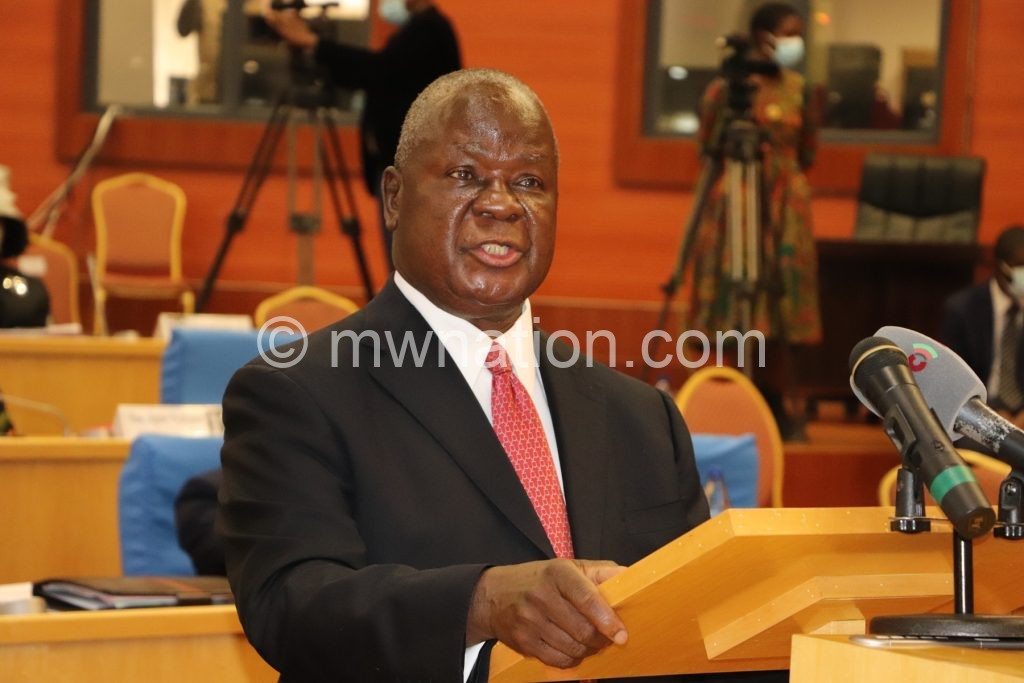Budget off rails
The Tonse Alliance administration’s maiden budget is in turmoil, chalking K340 billion in deficits in the first six months of implementation amid collapsed domestic revenue collection but a spending surge.
Even as local revenue fell, government ended up spending roughly K10 billion more than planned at the
end of December 2020, unofficial
Treasury figures The Nation has seen show. end of December 2020, unofficial
Between July and December 2020, Treasury spent K984.7 billion against revenue of K643.8 billion, according to the Treasury figures.
The development left the K2.2 trillion 2020/21 National Budget yawning by K340 billion at mid-year.
The deficit incurred so far represents 45 percent of the budget’s overall projected balance at K754.8 billion—in nominal terms and leaves virtually no fiscal space to increase spending in both social and economic sectors at a time Covid-19 is exerting significant fiscal pressure on government.

Based on the design of this year’s fiscal plan, Treasury planned to finance the deficit by borrowing K224.8 billion internationally and K530.1 billion locally.
The current budget had projected an expenditure of K975 billion in the first half of the fiscal year, but ended up forking out K984.7 billion, representing an over-expenditure of about K9.7 billion.
Our analysis shows that at K984 billion; government was spending an average of K164 billion per month, against an average revenue collection of K117 billion.
While total revenue—which combines domestic resources and grants—outperformed the mid-year target generally having raked in K643.8 billion against the projected K626.3 billion thanks, among others, to an outpouring of
grants in the face of Covid-19, the same pandemic that has depressed domestic revenue as the economy slowed.
A breakdown in the headline revenue figure shows that domestic revenue target for the first half of the fiscal year 2020/21 was K608.3 billion, but actual outturn by December 2020 was K571.8 billion, representing a six percent underperformance.
Of the targeted K608.3 billion domestic revenue, K550.6 billion
is tax-revenue target while
K57.7 billion is non-tax revenue target. is tax-revenue target while
The current financial y e a r ’s tax revenue performance, at 94 percent, is better than the same period in the 2019/20 National Budget, whose performance stood at 83 percent, signalling a rebound was in the works, but which is now under threat as Covid-19 wreaks more havoc.
Our source at Treasury privy to budget execution confided that during the first six months, it has not been easy for the Malawi Revenue Authority (MRA) to collect more resources from trade taxes as well as domestic value added taxes (VAT) on account of Covid-19 pandemic, which has now taken a new ravaging strain that has killed 518 people since April 2 2020 when the first cases were reported. Yesterday, the country registered 592 new cases, 10 new deaths and 81 recoveries the day.
Said the source: “It is a difficult year. Most of the budget lines are statutory in nature and, therefore, [our] expectation is that come the mid-year review, the budget will likely be increased due to the immense expenditure pressure.
“But if MRA is under-collecting, it means more borrowing and that means more pressure on our already high debt stock. As it stands now, efficiency is the only way out as those budget assumptions underpinning this budget [no longer hold].”
Currently, 80 percent of
expenditure by government is statutory, meaning that they cannot be deferred. These include wages, salaries and interest payments; implying that expenditure towards Covid-19 mitigation and other investment projects is only sharing the remaining 20 percent.
Out of this tot a l expenditure of K2.2 trillion, K1.7 trillion alone is earmarked for recurrent expenses, comprising K523.7 billion for wages and salaries, K376 billion for interest payments, K308.9 billion for goods and services, K266.0 billion for social benefits and K97.4 billion for subvented organisations. That leaves negligible fiscal space for government to manoeuvre.
When contacted to comment on the figures covering the first half of the current financial year, Ministry of Finance spokesperson Williams Banda declined to delve into the figures, saying: “This information will be highlighted in the Minister’s Mid-year Budget Review Statement. So, the general public should wait for the minister’s statement.”
However, over a l l , he insisted that the imp l eme n t a t ion of the2020/21 National Budget is on track, stressing that Malawians should not get worried with budget deficits, describing such deficit as a normal practice all over the world.
Said Banda: “What is important is this: How does government deal with the rising debt due to persistent recording of deficits? The new government has put in place a debt management strategy that includes both how to avoid its increase as well as how to retire the outstanding debt.
“In the short-term, government has focused on restructuring the debt from short-term to long-term debt as a temporary measure to create fiscal space. Government has also emphasized on concessional loans with soft terms. Government is also putting in place a debt retirement fund, which will deliberately put aside resources for retiring debt. So, deficits are normal in government operations.”
As of June 2020, the country’s public debt stood at K4.1 trillion or 65 percent of gross domestic product (GDP), thus almost double the value of the 2020/21 National Budget.
By October 2020, domestic stock alone amounted to K2.5trillion, or 37.3 percent of GDP, which is also an equivalent of about 60 percent of total public debt.
Projections by the International Monetary Fund indicate that Malawi’s debt stock will likely hit 78 percent of GDP, probably the highest debt to GDP ratio since the country benefited from the Highly Indebted Poor Countries initiative
in 2006.
Banda also said government is banking on the formulation of the Domestic Revenue Mobilisation Strategy that will help the country to enhance the collection of revenue for budget implementation going forward.
Meanwhile, economic analysts we spoke to yesterday have branded the2020/21 Budget as “difficult to implement,” advising the Tonse administration to use the Mid-Year Budget Review as an opportunity to re-prioritise and do some expenditure cuts on non-essentials.
“ T h e r e v e n u e underperformance continues to widen the fiscal deficit. With limited fiscal space, this may lead to an increase in public debt, especially domestic debt, which has high risk to reach unsustainable levels.
“With the Covid-19 second wave, it is also imperative to revise the revenue projections going forward,” said Economics Association of Malawi president Lauryn Nyasulu in an interview yesterday.
Botswana-based Malawian economist Noel Lihiku on Sunday strongly advised government against increasing expenditure during the mid-year review, but instead re-allocate money to areas that can yield high returns.
“Reallocation within the budget lines is a way to go and government has started doing this by that presidential directive to channel K17.5 billion towards Covid-19 response. I believe this money is specifically for Covid-19 response and not for the whole health sector,” he said.
Commenting on the same, University of Malawi’s Chancellor College associate professor of economics Levison Chiwaula said it is clear that “we are in for big trouble” as the Covid-19 pandemic has essentially increased expenditure needs while limiting sources of revenue.
He said: “At mid-year budget review, the government should look for more financing because reducing expenditure is almost impossible as most of it is statutory and emergency spending, which cannot be tampered with. It should be clear that we will need more resources than we projected when we were passing the budget because the epidemiology of Covid-19 has evolved for the worse.”
While describing the 2020/21 fiscal plan as difficult to implement, Centre for Research and Consultancy executive director Milward Tobias said in an interview yesterday that Treasury is unlikely to increase the headline expenditure figure, but rather just shift resources around.
He said: “There does not seem to be space to accommodate any increase at a time revenues are subdued. In this case, there is no budget line that wins or loses. It is doing the best for the interest of the nation. If all the money has to go to health, it does not make health a winner. It is managing a crisis





